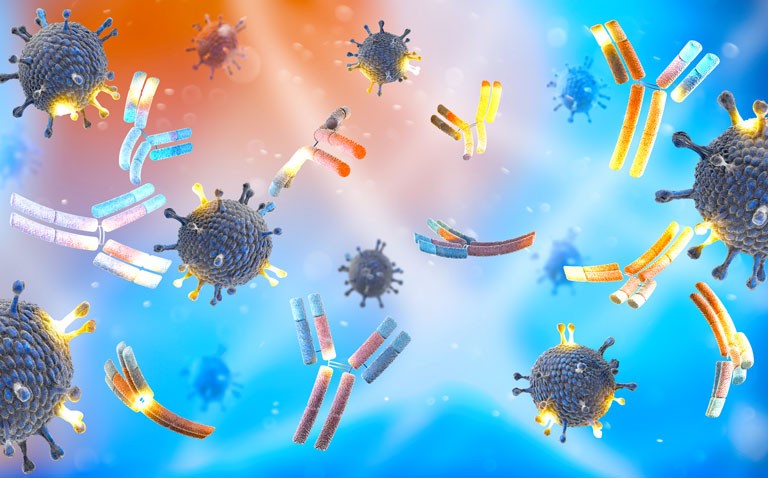While REGEN-COV contains two monoclonal antibodies binding to different viral sites, it is only effective in seronegative patients.
The use of monoclonal antibodies have been shown to neutralise the COVID-19 virus in cell cultures and produce a significant reduction of viral load in vivo. A combination of two mAbs, casirivimab and imdevimab, which bind to separate parts of the COVID-19 receptor binding domain of the spike protein, are able to block entry of the virus into host cells. Since the mAbs bind to separate sites, there is reduced risk of antiviral failure. The use of this mAbs cocktail, known as REGEN-COV, has been shown to reduce the risk of hospitalisation or death among infected patients, in an outpatient setting. In addition, the manufacturer, Regeneron, has provided initial data which suggests that in hospitalised, seronegative patients, REGEN-COV reduced daily viral load. Whilst encouraging, no anti-viral therapy has been shown to reduce death among those hospitalised with COVID-19. This led the RECOVERY team to undertake a randomised trial of REGEN-COV among seropositive patients, hospitalised with COVID-19. For the trial, eligible patients (those with either clinically suspected or confirmed COVID-19 infection), were randomised in a 1:1:1 ratio to either standard care or standard care plus REGEN-COV or standard care and convalescent plasma. Among patients assigned to REGEN-COV, treatment consisted of a single dose (4g of both mAbs) in 250 ml saline infused over 60 minutes. The primary outcome of the trial was 28-day all-cause mortality and secondary outcomes included the time to discharge from hospital and in those not receiving mechanical ventilation at randomisation, a composite outcome of mechanical ventilation or death.
Findings
A total of 4839 patients were randomised to REGEN-COV and 4946 to usual care. The mean age of study participants was 61.9 years (37% female) and 78% of white ethnicity. However, the complete cohort included 3153 (32%) participants who were seronegative and 5272 (54%) who were seropositive. Among those allocated to REGEN-COV, 24% of seronegative patients and 30% of patients receiving usual care died within 28 days (rate ratio, RR = 0.80, 95% CI 0.70–0.91, p = 0.001).
In an analysis all the whole cohort (irrespective or serological status), 20% of those allocated to REGEN-COV and 21% of those given standard care died within 28 days (RR = 0.94, 95% CL 0.86 – 1.03, p = 0.17). Furthermore, among seronegative patients, progression to mechanical ventilation or death was lower among those receiving REGEN-COV compared to standard care (28% vs 32%).
In discussing their results, the authors noted that there was only an apparent benefit in seronegative patients receiving REGEN-COV. The suggested that the use of REGEN-COV should be restricted to seronegative patients.
Citation
RECOVERY Collaborative Group. Casirivimab and imdevimab in patients admitted to hospital with COVID-19 (RECOVERY): a randomised, controlled, open-label, platform trial. MedRxiv 2021










